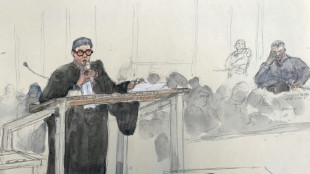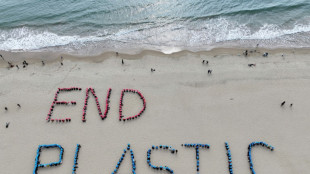
-
 Brazil's top court takes on regulation of social media
Brazil's top court takes on regulation of social media
-
Thousands still queuing to vote after Namibia polls close

-
 Trump taps retired general for key Ukraine conflict role
Trump taps retired general for key Ukraine conflict role
-
Canadian fund drops bid for Spanish pharma firm Grifols

-
 Argentine ex-president Fernandez gives statement in corruption case
Argentine ex-president Fernandez gives statement in corruption case
-
Mexico says Trump tariffs would cost 400,000 US jobs

-
 Car-centric Saudi to open first part of Riyadh Metro
Car-centric Saudi to open first part of Riyadh Metro
-
Brussels, not Paris, will decide EU-Mercosur trade deal: Lula

-
 Faeces, vomit offer clues to how dinosaurs rose to rule Earth
Faeces, vomit offer clues to how dinosaurs rose to rule Earth
-
Ruby slippers from 'The Wizard of Oz' up for auction

-
 Spain factory explosion kills three, injures seven
Spain factory explosion kills three, injures seven
-
US Fed's favored inflation gauge ticks up in October

-
 Defence lawyers plead to judges in French mass rape trial
Defence lawyers plead to judges in French mass rape trial
-
US says China releases three 'wrongfully detained' Americans

-
 New clashes in Mozambique as two reported killed
New clashes in Mozambique as two reported killed
-
Romania officials to meet over 'cyber risks' to elections

-
 Chelsea visit next stop in Heidenheim's 'unthinkable' rise
Chelsea visit next stop in Heidenheim's 'unthinkable' rise
-
Former England prop Marler announces retirement from rugby

-
 Kumara gives Sri Lanka edge on rain-hit day against South Africa
Kumara gives Sri Lanka edge on rain-hit day against South Africa
-
Namibia votes with ruling party facing toughest race yet

-
 Spurs goalkeeper Vicario out for 'months' with broken ankle
Spurs goalkeeper Vicario out for 'months' with broken ankle
-
Moscow expels German journalists, Berlin denies closing Russia TV bureau

-
 Spain govt defends flood response and offers new aid
Spain govt defends flood response and offers new aid
-
France says Netanyahu has 'immunity' from ICC warrants

-
 Nigerian state visit signals shift in France's Africa strategy
Nigerian state visit signals shift in France's Africa strategy
-
Stock markets waver as traders weigh Trump tariffs, inflation

-
 Tens of thousands in Lebanon head home as Israel-Hezbollah truce takes hold
Tens of thousands in Lebanon head home as Israel-Hezbollah truce takes hold
-
Opposition candidates killed in Tanzania local election

-
 Amorim eyes victory in first Man Utd home game to kickstart new era
Amorim eyes victory in first Man Utd home game to kickstart new era
-
Fresh fury as Mozambique police mow down protester

-
 Defeat at Liverpool could end Man City title hopes, says Gundogan
Defeat at Liverpool could end Man City title hopes, says Gundogan
-
Indonesians vote in regional election seen as test for Prabowo

-
 Guardiola says no intent to 'make light' of self harm in post-match comments
Guardiola says no intent to 'make light' of self harm in post-match comments
-
New EU commission gets green light to launch defence, economy push

-
 Opposition figures killed as Tanzania holds local election
Opposition figures killed as Tanzania holds local election
-
Taiwan Olympic boxing champion quits event after gender questions

-
 European stocks drop on Trump trade war worries
European stocks drop on Trump trade war worries
-
Volkswagen to sell operations in China's Xinjiang

-
 FA probes referee David Coote over betting claim
FA probes referee David Coote over betting claim
-
Serbia gripped by TV series about murder of prime minister

-
 Putin seeks to shore up ties on visit to 'friendly' Kazakhstan
Putin seeks to shore up ties on visit to 'friendly' Kazakhstan
-
New EU commission pushes for defence and economy spending

-
 Plastic pollution talks must speed up, chair warns
Plastic pollution talks must speed up, chair warns
-
Pakistan web controls quash dissent and potential

-
 1,000 Pakistan protesters arrested in pro-Khan capital march
1,000 Pakistan protesters arrested in pro-Khan capital march
-
ICC prosecutor seeks arrest warrant for Myanmar junta chief

-
 Philippine VP's bodyguards swapped out amid investigation
Philippine VP's bodyguards swapped out amid investigation
-
EasyJet annual profit rises 40% on package holidays

-
 Ukraine sees influx of Western war tourists
Ukraine sees influx of Western war tourists
-
Greeks finally get Thessaloniki metro after two-decade wait


DR Congo inters Lumumba remains after nationwide pilgrimage
The scant remains of DR Congo's fiery independence hero Patrice Lumumba were interred on Thursday after a nine-day homage that stirred traumatic memories and national pride.
"Sleep in peace now," President Felix Tshisekedi said.
Hailing Lumumba as "our national hero," Tshisekedi declared: "May the land of our ancestors be sweet and mild to you."
A single gold-crowned tooth, returned by Belgium, is all that remains of the young nationalist.
He was murdered in January 1961 at the age of 35, just months after becoming Congo's first post-colonial prime minister.
In a solemn ceremony coinciding with the country's 62nd anniversary, the remains were interred in a mausoleum beneath a statue of Lumumba on an avenue in the capital Kinshasa that also bears his name.
Didier Shonda, 24, told AFP that he had come from Lumumba's home region of Sankuru for the ceremony.
With the return of the remains "his spirit will no longer wander," said Shonda.
"We now know where to come to replenish our resources to totally free our country and the youth of Africa."
- Radical -
Lumumba was among the vanguard of pan-African leaders who led the charge to end colonialism in the late 1950s.
He rose to prominence in 1958 when he launched a political party, the Congolese National Movement (MNC), which called for independence and a secular Congolese state.
He stunned Belgium with a speech on independence day on June 30, 1960 that was attended by the country's monarch, King Baudouin.
In it, he accused the exiting colonial masters of racism and "humiliating slavery."
"We experienced the slurs, the insults, the beatings that we had to undergo morning, noon and evening, because we were negroes," he declared.
Just 75 days later, Lumumba was forced out by a coup fomented with the help of Belgium and the CIA, which also opposed the support he had requested from the Soviet Union.
In January 1961, Lumumba was handed over to the authorities in mineral-rich southeast Katanga province, which had seceded from the fledgling nation months earlier with Belgium's support.
He was shot dead and his body was dissolved in acid, but a Belgian police officer involved in the killing kept one of his teeth as a trophy.
In 2016, the Belgian authorities seized the relic from his daughter.
After a long campaign by Lumumba's family, Belgium returned the tooth on June 20, a move that followed a visit of reconciliation by Baudouin's nephew and successor, King Philippe.
- Pilgrimage -
The remains were taken to Lumumba's home area of Sankuru in the centre of the country, to his political stronghold of Kisangani in the northeast and finally to the place where he was murdered before being flown to Kinshasa.
Five former prime ministers joined a funeral vigil on Thursday alongside current government chief Jean-Michel Sama Lukonde.
"The figure of Patrice Lumumba is a prime symbol of national unity, transcending political differences," said Evariste Mabi, a premier in the 1980s under Lumumba's nemesis, dictator Mobutu Sese Seko.
"(He) embodies the people's successful struggle for freedom."
Belgium's rule over what is now the Democratic Republic of Congo was one of the harshest imposed by the European powers that ruled most of Africa in the late 19th and 20th centuries.
King Leopold II governed the vast country -- a swathe of central Africa the size of continental western Europe -- as his personal property between 1885 and 1908, before it became a Belgian colony.
Historians say millions were killed, mutilated or died of disease as they were forced to collect rubber under his rule. The land was also pillaged for its mineral wealth, timber and ivory.
Tshisekedi thanked Lumumba's family for their campaign but also singled out "the Belgian people and authorities" for praise.
"They have helped the restoration of truth... after years of denial," he said.
"It's only after telling the truth, after establishing responsibilities, that we, Congolese and Belgians, can jointly enter the phase of forgiveness, justice and genuine and final reconciliation."
C.Meier--BTB

